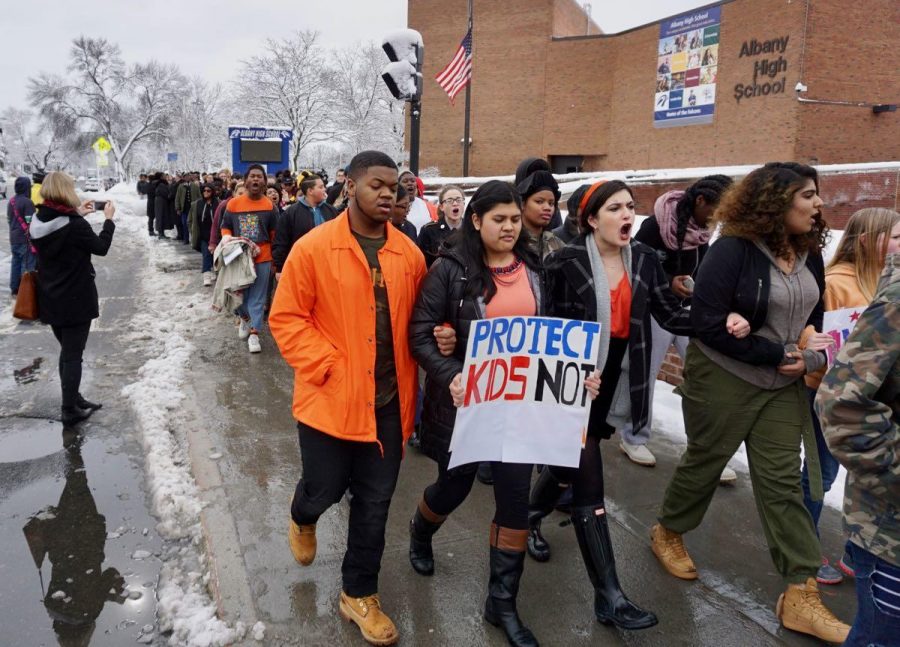Opinion: Why Students Shouldn’t Be Activists
*The views and opinions expressed in the following piece are those of the author alone and do not necessarily reflect the views and opinions of The Nest or Albany High School.*
Over the past several years, the political framework in America has been the victim of a growing acceptance of young groups advocating political change. Protests brimming with a substantial supply of student activists such as the March for Our Lives, March for Science, and the National School Walkout have demonstrated a willingness to express opinions at an early age and urge lawmakers to work towards a safer and more moralistic society.
Despite the few prominent outcomes these students have achieved, it’s important to step back and view the repercussions this entails.
Nowadays, protests seem to occur on a remarkably regular basis; events for practically every injustice that plagues our society. It’s a type of cultural semantic satiation, embedding our lives to the point where we no longer view protests and marches as such, but rather as “walks of solidarity.” This absence of emphasis is precisely why we as a society, but more specifically we as students, need to pick-and-choose our battles more wisely.
As a non-participating observer, I often view the news to find that, sure enough, another outburst of outrage has developed in some part of the country. Hyperbolic signs painting an image of a disastrous nation with egregious moral values are a landmark of these incidents, reflecting an extraordinarily pessimistic view of contemporary human achievement.
But these results certainly should be of no surprise – the increased volume of younger activists would naturally spur impulsive and irrational beliefs into the mainstream. Likewise, their infectious ignorance would be matched only by their arrogance, a combination that characteristically defines mental deficiency.
Despite the fact that I am a student myself and my criticism is therefore somewhat hypocritical and ironic, a distinction should be made at the line of political expression and political advocacy. Political expression entails the entitlement and projection of an opinion, while advocacy involves a direct call to action. Although political advocacy inherently includes expression of a particular opinion, this may not always be the case vice-versa. As an example, wearing political attire or in my case, writing an article is not necessarily as much a direct call to action as a public march for gun control near legislative buildings. On these grounds, my ability to criticize young adopters of political advocacy is possible.
At the same time, these concerns aren’t cynical doubt – the intentions of likely all of these activists are to create a more prosperous and healthy society. Nevertheless, vague and repetitive marches for “solidarity” alongside inconsistent, emotionally charged signs such as, “Children or Guns – why is this even a question?” are not only badges of fragmented cognition but are also facilitators of unwarranted chaos and division.
While these intentions may be morally sound, they ultimately produce counterproductive outcomes. A march that works towards unification all but achieves it when they polarize opposing opinion as insensitive to the death of children.
None of this is to go without saying that student activists can indeed make a positive difference at such a young age – albeit some of our flaws must be refined before we press for consequential policy changes.
For one, we must seek to remedy our cultural ID and choose what we fight for more deliberately. Unconditional and routine activism for its own sake does nothing but undermine your goal when a legitimate issue actually arises. Rectifying problems that hold personal value not only appears more genuine, but it also dampens the sociocultural mob mentality.
Simultaneously, we must gain greater knowledge on issues – it has become a far too common sight to watch young members of all political affiliations get ridiculed by opposition for their ignorance. Regardless of the topic, if you’re passionate about it, educating yourself on every aspect prior to an event is unquestionably more logical than blindly attending for harmony alone. Additionally, it’s important to recognize that compromise is inevitable in politics and people don’t always get everything they desire.
Sadly, the large majority of active high school students are both unaware of and unwilling to grasp a wholesome understanding of a political issue. Until we collectively reach a point of proper mental discipline, students shouldn’t broadly assert their dominance in the political sphere.


